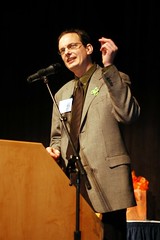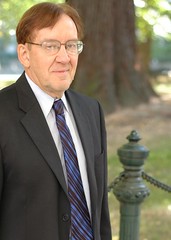“We need a replacement. But it must be the right kind of new bridge… Approval today will only move the bridge project proposal from one phase of evaluation to the next.”
–Commissioner Sam Adams in today’s Oregonian
Today is an important day for supporters and critics of the Columbia River Crossing project.
Portland City Council, the group whom many think pose the best chance at throwing a major wrench in the estimated $4.2 billion project, will vote on their “locally preferred alternative” (LPA). So far, no official agency or government body has voted against it.
But in recent weeks, opposition to the project has grown considerably and City Council has heard loud and clear that many Portlanders are concerned about moving forward.
At a press conference yesterday, a coalition of advocates and experts issued grave concerns about the project. The event was held at Piccolo Park in Southeast Portland, a site chosen for its symbolism in the defeat of a massive highway project that never got built — the Mt. Hood Freeway.
Critics feel that the CRC project team is hell-bent on building a 12-lane mega-bridge that will induce more traffic, encourage sprawl, and increase greenhouse gas emissions. But CRC staff, Commissioner Adams (see below), and other supporters of the project say that the LPA decision is simply a vote for a very preliminary phase of the project, and that the key planning decisions remain.
But even with those assurances, many see today’s vote as a last chance to stop a project that is backed by an intimidating amount of bureaucratic inertia that includes strong support from trade and business organizations and the governors and transportation departments (ODOT and WashDOT) from both Washington and Oregon.
Evan Manvel, the former director of the Bicycle Transportation Alliance and now chief policy czar for the Oregon League of Conservation Voters, wrote a guest article on BlueOregon yesterday saying that if Council votes “yes” on their CRC resolution today, they’ll miss any chance of steering the project down the road (emphasis mine):
“… the Portland City Council will vote on whether to sign off on the project (the LPA, or locally preferred alternative), based on scant and sketchy information about global warming impacts, financing, and bridge design. If they do, their role becomes advisory. They no longer have any decision-making power on the project. They can ask nicely for the bridge to look pretty, to have bike lanes of a certain width, and so forth. But they can’t make it so. So make no mistake – once local governments sign off, they’re done.”
But, in an editorial that appears in today’s Oregonian, Commissioner (and mayor-elect) Sam Adams tries to explain that a “yes” vote today will not be the last we hear from City Council. He also seems to be trying to soften the blow when he votes “yes” on the project today:
“The Portland City Council’s vote today is not the ultimate or final “yes” to begin building the new bridge. Approval today will only move the bridge project proposal from one phase of evaluation to the next. It will simply establish the assumption for the next phase of study that the existing bridge will be replaced with no more travel lanes than exist today and that it must include an expansion of light rail.”
Also in that piece Adams writes that, “the governors of Oregon and Washington, each state’s congressional delegation and local stakeholders,” have given him, “assurance… that Portland’s concerns for planning the remainder of the project details will be addressed to our satisfaction.”
Adams’ editorial seems to make it clear that he has found the support on Council to vote in favor of the CRC today.
Ron Buel, founding publisher of the Willamette Week and a veteran transportation activist who has helped thwart several massive highway projects, says even if Council votes in support of the project today, there is still a silver bullet.
Buel told me that the CRC staff has left themselves open to a legal challenge because they violated strict rules that govern the public process around these types of projects (as laid out by the National Environmental Protection Act (NEPA)).
He says the Draft Environmental Impact Statement (DEIS), a report that Council (and others) are supposed to base their LPA decisions on, has left out key information including independent analyses of greenhouse gas emissions and induced travel.
Buel also points out that the timing of City Council’s first public hearing — which is coming after they issued a letter in support of the replacement bridge option and after the official DEIS comment period has ended — presents a “dream scenario” for anyone who might seek to challenge their adherence to NEPA guidelines.
What does Buel think City Council should do? Surprisingly (and perhaps somewhat sarcastically) he says they should support the 12-lane, replacement bridge option:
“For the City, selecting the big, new Replacement Bridge is a win-win proposition. They throw red meat to the special interest groups lobbying for the $4.2 billion, 12-lane bridge. At the same time, they know the CRC can’t be financed, and that a NEPA challenge will be successful, so that it becomes a bad project that will never be built, ultimately making opponents happy.”
But what does all this say about the viability of our political process, the way our democracy works? What it says isn’t good. It’s not a winner for the public interest.”
Stay tuned for a report from City Council later today…



